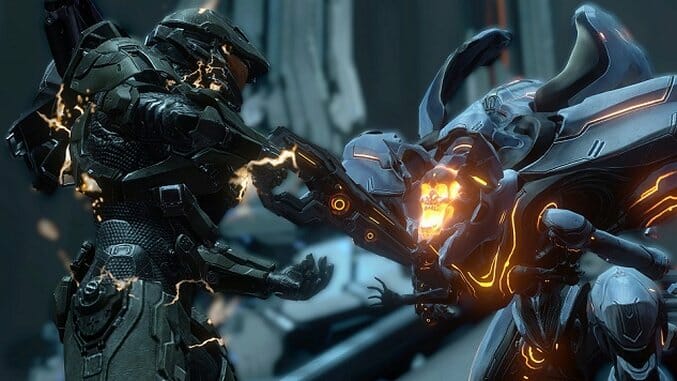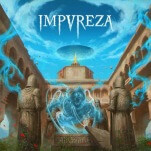Halo 5: Guardians Single-Player: You Wore Your Halo Out

This review only considers Halo 5’s single-player campaign. A separate piece late this week will discuss the multi-player elements.
Halo 5: Guardians is one of the most disappointing games that I have played in the past year.
I tried to write an introduction that beat around the bush a little before delivering the bad news, but it was too much effort for too little art. I’m sorry to break it to you. It bums me out.
I like the Halo games at their most experimental. Halo: ODST turned the series on its head by depowering the player character, forcing them to be mere humans who have to deal with the creatures that series protagonist Master Chief plows through by the dozens. Halo: Reach took the franchise into canonical history and imagined a nihilistic Saving Private Ryan-style story within the science fiction framework of the Halo universe. Those games are top-to-bottom committed to those concepts, from the narrative construction to the nitty-gritty mechanical experience of the game. ODST forced you to sneak around a great many enemies to avoid being crushed to dust; Reach had you fighting battles that were massively pitched against you. Those games, and the other Halo games that series originator Bungie created, feel considered. They feel like they were picked through with a comb in order to generate a very particular feeling through their unique narratives.
I’m not one to pine for the past, and I’m certainly not in the pack of people who lament that Bungie passed Halo over to the current developers, 343 Industries. I think that change is good, and that the talented hands and minds at a new studio devoted to the franchise could absolutely invigorate the Halo series as it charges into the future of infinite and unavoidable sequels. After all, ODST and Reach were both “invigoration” of the series, and they’re amazing.
The problem with Halo 5: Guardians is that there isn’t any invigoration. It’s stagnant, static, from both a story perspective and a mechanical one. There’s no reason to play this over Halo 3, Reach, or any other Spartan-based game of your choosing from the past decade.
The things that are different are merely parasitical developments from other massive first-person shooter games of the contemporary period. You can do some boosting, which feels much like Advanced Warfare’s exo suit boosting. You can jump and climb onto something, which adds a bit more strategy to the experience of play. You can now aim down your sights with all weapons, which the game calls Smart-linking for some reason, but if you get shot you’re pulled out of it. Those mechanical changes, as big as they are, are merely changes that bring this game in line with another franchise. We’re barrelling toward some kind of ur-shooter with these franchises, but the decision to add these particular mechanics to Halo feels almost cynical. There has always been something charming about a military-affiliated Master Chief who just runs around and shoots things like he’s living in Unreal Tournament world, and the addition of Call of Duty-style “tactical combat” invites a tone that the game neither wants nor can support.
There’s some justification, of course. Halo 5: Guardians has you controlling a group of serious military Spartans, and that necessitates a tactical understanding of the world. You can direct your teammates to take positions or attack certain enemies, and there’s more than enough military-esque chatter constantly coming at you constantly. You play as two distinct teams, one commanded by the classic Master Chief, the other led by up-and-comer Spartan Locke. The former has gone AWOL in order to track down and figure out what the hell has happened to his artificial intelligence best buddy/love interest Cortana. The latter has been sent to bring Master Chief in for…well, going AWOL. It doesn’t make a lot of sense, and it’s really all built on some early-game story content that isn’t worth getting into. It’s more important to note that the space military thinks that a team of Spartans might be able to hunt down and arrest a superhuman who has killed, conservatively, a bajillion aliens of various species. It’s patently ridiculous.
That’s how I feel about the broad narrative beats of this game. I feel that they’re ridiculous. They don’t cohere, and that failure isn’t for the normal reasons. Blockbuster games can sometimes feel a little uneven because of some structural issues. “Rollercoaster” games, like many of the Call of Duty games, often seem like they’re several set pieces stapled together by a paper-thin commanding plot. However, the strength of those set pieces often makes up for the lack of coherence; the ride is fun because of the sequence, not because it was a flawless exercise in consistent construction. Halo 5 doesn’t manage that. The game presents the stakes of most of its missions early on, and much of the game is spent just waiting for certain characters or processes to show up. Following that, you just react to those appearances. There’s no room for great encounter or mission design decisions, because at the end of the day there’s going to be some massive destruction or space travel that will interrupt anything that’s occurring in the mission.
In the opening of this piece, I characterized Halo 5 as disappointing, and I sincerely mean that word in its very specific meaning. The game is a great execution of the Halo series’ strengths. The horror of that is that the greatest hits, the conservative best-of features and mechanics, are dead boring. You move from arena to arena via open corridors. You shoot enemies. Sometimes those enemies have special things that need to be done to kill them, and sometimes those enemies don’t. The game often tries to inflate these moments with excitement, such as a mission where I had to attack the Covenant with the Arbiter and his Swords of Sanghelios at my side. I was still doing the same rote actions against the same set of enemies, but now I had an alien dude hollering at me about how good we were at winning.
-

-

-

-

-

-

-

-

-

-

-

-

-

-

-

-

-

-

-

-

-

-

-

-

-

-

-

-

-

-

-

-

-

-

-

-

-

-

-

-










































